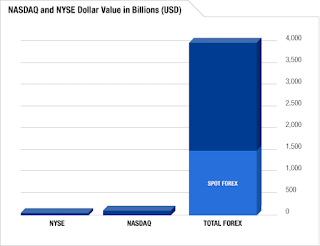Benefits of Forex Trading
- Market Liquidity and Volatility
The forex market is the largest and most liquid of the financial markets.
Daily activity often exceeds $4 trillion USD a day, with over $1.5 trillion of that conducted in the form of spot trading.
Forex spot trades consist of a contract to trade a given amount of a currency pair derivative with a market-maker, at the advertised buy / sell price (the spot rate).
It is the existence of volatility within the forex market that enables trader's to take advantage of exchange rate fluctuations for speculative purposes.
Traders must be aware that greater volatility also means greater risk potential.
Liquidity – Refers to the number of buyers and sellers in the market willing to trade at any given time. Generally speaking, the greater the liquidity within a market, the greater the number of trades completed, which translates into higher volumes.
Volatility – A measure of how much the price of a currency changes over time.
- Market Hours and Liquidity
Forex trading operates 24 hours a day, five days a week. The greatest liquidity occurs when operational hours in multiple time zones overlap.
It is important to understand the correlation between liquidity and market activity.
- Low Cost of Forex Trading
The cost to trade with most forex brokers is the spread. This is the difference between the bid and the ask price.
Spreads in the forex market also tend to be much less (or tighter) than the spreads applied to other securities such as stocks. This makes OTC forex trading one of the most cost-effective means of investment trading.
- Advantages of Margin-Based Trading
Most OTC forex brokers offer margin-based trading accounts.
Margin-based accounts differ from credit-based accounts in that when trading in a margin account, you must first open an account with your broker, and then fund the account by depositing money into the account.
Once you have funded a margin account with your broker, you can engage in any trading activity you wish so long as you have sufficient margin remaining in your account.
Leverage makes it possible for you to trade larger positions than would otherwise be possible based on your actual account balance.
This means that leverage can provide greater potential for returns.
The downside of course is that there is also greater potential to lose money and you can incur significant losses in your account very quickly.
Don't worry if some of these terms such as spread or margin are new to you. We will be covering all this in greater detail in Lesson 3 – Currency Trading Conventions – What You Need to Know Before Trading.
- Potential Profit Regardless of Market Direction
A short-sale – or simply a short – is the selling of a currency pair derivative before you buy it.
It is very easy to enter into a short-sale when trading in the forex market.
In order to make a profit on a short, you must buy the currency derivative back for less than you received when you sold it. The difference represents your profit or loss.
The ability to engage in short-selling means that it is possible for you to profit no matter which way the market is trending.
When rates are increasing, you can earn a profit if you buy (go long) a currency pair derivative, and then sell it later for more than you paid.
When rates are falling, you can earn a profit if you sell (go short) a currency pair derivative, and then buy it later for less than you earned when you originally shorted the currency pair derivative.


Comments
Post a Comment